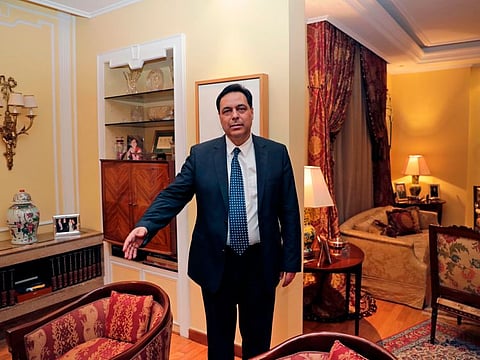Newsmaker: Hassan Diab — enter the academic
Lebanon’s PM-designate may find country’s fractured polity hard to negotiate

Hassan Diab is currently the prime minister designate of Lebanon, nominated for the job by 69 MPs in the Lebanese Parliament, representing the Free Patriotic Movement, Hezbollah, and the Amal Movement. None of the Sunni members of the Future Movement, led by ex-Prime Minister Saad Al Hariri, endorsed Diab for the job. Nor did Christians or the Lebanese Forces or his former boss and longtime friend, ex-prime minister Najeeb Mikati, under whom Diab had served as education minister back in 2011-2014.
Speaking to the press after parliamentary consultations with President Michel Aoun on October 19, Mikati said: “With all due respect, this has nothing to do with friendship.”
The Hezbollah-led March 8 Coalition is marketing Diab as a professional technocrat, unaffiliated with any of the political parties. He will be tasked with forming a cabinet of technocrats, where ministers are chosen for their professional merit, rather than political affiliation. His Cabinet — if and when it ever sees the light — will be tasked with supervising early parliamentary elections and addressing the massive economic challenges caused by a collapsing banking sector.
Diab's 137-page academic CV, gone viral on social media, has been mocked for being “longer than the Lebanese constitution.” His former adviser at the ministry, Nashaat Mansour, is now earmarked to assume the portfolio of education in the Diab governmentSami Moubayed
Its main challenge is to unlock $11 billion (Dh40.3 billion) in international aid, pledged to Lebanon in Paris back in April 2018. Those funds were held back, awaiting administrative and political reforms in Lebanon, which Prime Minister Hariri was unable to deliver. Prime on the list of conditions was clipping the wings of Hezbollah.
Early life
Hassan Diab was born to a Sunni Muslim family in Beirut on January 6, 1959. He obtained a BA from Leeds Metropolitan University in the United Kingdom, and a Master’s in Systems Engineering from the University of Surrey. He then obtained a PhD in Computer Engineering from the University of Bath, returning to Lebanon where he joined the faculty of the prestigious American University of Beirut (AUB).
Diab taught non-stop at the AUB until being appointed minister of education in 2011. Between 2006-2011, he was Vice-President of AUB’s Regional External Programme. Over a 35-year career in academia, he has published over 80 academic studies in peer-reviewed academic journals. His research focused on cryptography on high performance computer systems, reconfigurable computing, embedded systems, and higher education in the Middle East.
In 2004, Diab went to Oman where he was tasked with co-founding Dhofar University and its three faculties: Business Administration, Applied Science, and Engineering. He served as the founding dean of the Faculty of Engineering and still serves on its Board of Trustees.
Meanwhile, his wife Nawar was a faculty member at the Lebanese American University (LAU) and former lecturer at Los Angeles University in the US.
Political career
Diab’s academic career was suspended by a brief stint as Minister of Education under Prime Minister Mikati in 2011-2014. He was nominated for the job by his father-in-law Radwan al Mawlawi, a former media official and close friend of Najeeb Mikati.
The tenure was not without controversy, however, as he was accused of publishing a book, at government expense, outlining his achievements as minister, and of naming a school after his mother, who died three weeks before his appointment. His 137-page academic CV, gone viral on social media, has been mocked for being “longer than the Lebanese constitution.” Diab’s former adviser at the ministry, Nashaat Mansour, is now earmarked to assume the portfolio of education in the Diab government.
Prime Minister-designate
Hassan Diab is the fourth serious candidate for the Lebanese premiership, nominated for the job by outgoing foreign minister Gibran Basil, head of the Free Patriotic Movement and son-in-law of President Michel Aoun. Diab has been close to the Aounists since his first tenure government, introduced to them by Sonia Al Khoury, the director of guidance at the Ministry of Education (now director of Cultural Affairs). She is often described as the “third daughter” of Michel Aoun.
Previous prime ministerial candidates have been flatly rejected by angry protesters who took to the streets of Lebanon on October 17. The first candidate was ex-Economy Minister Mohammad Al Safadi, rejected for being part of the political class.
Second-in-line was ex-Justice Minister Bahij Tabbara, who was turned down because of his advanced age (being in his early nineties).
Third was the independent businessman Samir Al Khatib, who withdrew his candidacy after meeting with the Grand Mufti Abdul Latif Deryan, who told him that the clerical establishment would accept nobody but Saad Al Hariri.
Although he did not name Hassan Diab as a candidate for the premiership, Hariri said that he did not mind meeting him but would not join his government, nor would any member of his Future Movement. While angry Hariri partisans took to the streets of Beirut after Diab’s nomination surfaced, it remains to be seen how the new political development unfolds in Beirut.
Sami Moubayed is a Syrian historian and former Carnegie scholar. He is also author of Under the Black Flag: At the frontier of the New Jihad.



